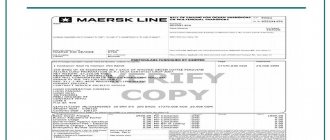A foreign trade transaction contract is the main document regulating a foreign trade transaction, establishing and confirming the rights and obligations of its participants, as well as regulating the legal conditions for owning the subject of the contract. For example, a contract is used when exporting products to Kazakhstan or Uzbekistan.
Competent conclusion and execution of a foreign economic contract becomes a guarantee of timely and full compliance with the terms of the concluded agreement. When preparing a foreign trade contract, not only the requirements of the legislation of the Russian Federation and the laws of the country where your partner is registered must be taken into account, but also the requirements of international legislation, for example, the terms of the UN Vienna Convention, must be met.
The role of INCOTERMS in a foreign trade contract
The writing of a foreign economic contract should be based on the uniform rules set out in the Incoterms 2010 . Based on the requirements of Incoterms, the responsibilities assigned to the parties concluding the contract for transportation, transfer of cargo and other technical issues are agreed upon. Often, a foreign economic agreement receives a unique number in the form of three groups, each of which consists of an alphanumeric code, which contains information about the country of the buyer or seller, the enterprise code according to the all-Russian standard and the serial number of the international agreement being concluded.
Sample import contract
In the file provided you will find a sample of the import contract I used for the supply of goods in Ms Word format and specifications for it. This is a “framework” contract on FOB terms for a total amount of 40,000 US dollars in Russian and English.
IP Novikov E.A. — foreign trade contract sample
IP Novikov E.A. - specification for the contract
Structure of a Foreign Trade Contract
Requirements for foreign trade contracts: the structure of a foreign trade agreement is similar to the contract in force in Russia. It must also contain the place and date of conclusion of the agreement, details of all parties, signatures and seals of representatives of organizations. All other sections are optional; their presence and content directly depend on the specifics of the concluded transaction.
As a rule, a foreign economic contract contains the following sections:
- subject of the contract,
- transaction cost,
- deadlines for fulfilling obligations,
- basic conditions,
- liability of the parties for non-compliance with the terms of the contract and in the event of a force majeure situation,
- procedure for considering controversial issues.
- The details of the parties must contain not only the legal, but also the actual address of the parties to the agreement.
Instructions: draw up a supply agreement
DELIVERY AGREEMENT No. _________________ "___"____________20__
___________________, hereinafter referred to as the “Supplier” represented by _________________________________, acting on the basis of the Charter, on the one hand, and ________________________, hereinafter referred to as the “Buyer” represented by ________________________________________________, acting on the basis of the Charter of the enterprise, on the other hand, have entered into this Agreement as follows:
1. The Subject of the Agreement
1.1. The Supplier undertakes to transfer the products (___product name___) (hereinafter referred to as the “Products”) and related documents into the ownership of the Buyer, and the Buyer undertakes to accept this Product and pay for it under the terms of this Agreement.
1.2. Quantity, assortment, price and payment terms are agreed upon by the parties in invoices, which are an integral part of this Agreement.
1.3. Regardless of the volume of purchase, the “Buyer” receives a discount on the Product in the amount of 10% of the total invoice amount.
2. Delivery times and procedure
2.1. During the term of this Agreement, the Goods are delivered to the Buyer in batches according to invoices agreed upon by the parties.
2.2. The goods are delivered by the Supplier upon the Buyer’s request to the address specified by the Buyer before the end of the month in which the Buyer paid the invoice, in the quantity and assortment specified in the invoice.
2.3. The date of delivery of the goods is considered to be the date of transfer of the Goods to the Buyer (the date of preparation of the invoice).
2.4. Acceptance of goods from the Supplier is formalized by signing an invoice and a delivery note for the transferred Goods, which reflects the result of its acceptance by quantity, indicating the date of acceptance of the goods by the Buyer's representative. The invoice is signed in such quantity that each of the parties involved in the transaction for the supply of goods has the required number of copies left.
3. Quality, completeness, packaging and warranty for the product.
3.1. The product is supplied in the Supplier's packaging, which ensures its safety during proper storage and transportation.
3.2. The quality and completeness of the Goods must comply with the purpose of the goods, the requirements for the technical characteristics of the Goods in the country of origin, as well as the standards and technical conditions in force in the Russian Federation.
3.3. In case of delivery of goods of inadequate quality, the Supplier is obliged to replace or accept the rejected goods within the time period agreed with the Buyer on the basis of the rejection invoice.
3.4. The warranty period for the Goods is 6 months from the date of delivery, unless other periods are specified in the Supplier's Warranty Obligations transferred to the Buyer along with the Goods (in the form of Warranty coupons, entries in invoices, etc.)
4. Product price and payment procedure
4.1. The prices of the supplied goods, including VAT, the cost of packaging, labeling, are agreed upon by the parties in invoices issued by the Supplier. Prices for the same goods in different batches of goods may differ, which is established by the corresponding invoice.
4.2. Payment for the Goods (batch of goods) is made by the Buyer in cash in Russian rubles, by transferring funds to the Supplier's bank account no later than the deadline specified in the invoice for the supplied Goods (batch of goods).
4.3. Documents confirming payment must indicate the date and invoice number.
4.4. The date of payment is the date of receipt of funds to the Supplier's bank account.
4.5. If the Buyer has sampled the Goods for an amount less than what he previously transferred to the Supplier's bank account, the remaining amount can be used by the Buyer when purchasing the next batch of Goods.
If the Buyer has sampled the Goods for an amount of money exceeding the amount transferred by him to the Supplier's bank account, then the amount of money for the unpaid Goods is paid by the buyer to the Supplier's bank account no later than 10 days from the date of delivery (transfer) of this Product (batch of goods) to the Buyer.
4.6. By agreement of the parties, it is possible to supply the Goods (batch of goods) with deferred payment. When payment is deferred, the amount of money for unpaid Goods (batch of goods) accepted by the Buyer from the Supplier is deposited by the Buyer into the supplier’s bank account no later than 10 days from the date of delivery (transfer) of this product (batch of goods) to the Buyer.
4.7. In case of non-payment of the cost of the Goods (batch of goods) in the amount and terms indicated in the invoice for the supplied Goods (batch of goods), the application is cancelled. In this case, the Buyer, if there is a subsequent need to purchase the Goods, sends a new application to the Supplier and pays for the goods on time.
4.8. In the event of a violation by the Supplier of the delivery deadline established in clause 2.2 of the agreement, the Buyer has the right to suspend payment of payments in proportion to the number of days for which delivery is delayed by the Supplier. At the same time, violation of the delivery deadline by the Supplier is not grounds for refusal of the contract and submission of claims for compensation of losses by the Buyer.
5. Rights and obligations of the supplier
5.1. The supplier is obliged:
5.1.1. Deliver the goods in quantity, assortment and terms established by this Agreement.
5.1.2. Simultaneously with the delivery of each batch of Goods, transfer to the Buyer all documents related to it (technical passport, quality certificate, operating instructions, etc.)
5.1.3. Bear the risk of accidental loss or accidental damage to the Goods until they are transferred to the Buyer or the carrier.
5.1.4. Deliver the goods free from the rights of third parties.
5.1.5. Ensure that the Goods are packaged in containers that ensure the safety of the Goods during transportation and storage.
5.2. The Supplier has the right:
5.2.1. Refuse to execute this Agreement unilaterally in the event of repeated violation by the Buyer of the terms of payment for the Goods.
6. Rights and obligations of the buyer
6.1. The buyer is obliged:
6.1.1. Accept and pay for the delivered Goods under the terms of this Agreement.
6.2. The buyer has the right:
6.2.1. If the Supplier, who has received payment for the Goods, does not fulfill the obligation to transfer the Goods within the prescribed period, demand from the Supplier to transfer the paid Goods or return the amount of advance payment for the Goods not transferred by the Supplier.
7. Responsibility of the parties
7.1. For failure to fulfill or improper fulfillment of their obligations under this Agreement, the Parties are liable in accordance with current legislation and the terms of this Agreement.
7.2. In case of delay in repayment of debt incurred in the manner provided for in clauses 4.5 and 4.6 of this Agreement. The Buyer pays the Supplier a penalty in the amount of 0.1% of the overdue amount for each day of delay.
7.3. Payment of penalties does not relieve the Parties from fulfilling their obligations under this agreement.
8. Dispute resolution procedure
8.1. The parties take the necessary measures to ensure that controversial issues and disagreements arising during the execution and termination of this agreement are resolved through negotiations.
8.2. If the Parties do not reach an agreement on controversial issues through negotiations, the dispute may be resolved in court.
Compliance with the claims procedure for pre-trial dispute resolution is mandatory for the Parties. The claim is submitted in writing and signed by the heads of the Parties or their authorized deputies.
The claim is considered within 30 days from the date of receipt. The response to the claim is signed by the heads of the Parties or their authorized deputies.
9. Force majeure
9.1. In the event of force majeure obligations, which include: natural disasters, riots, strikes, revolutions, military actions, the entry into force of legislative acts, government regulations, orders of government bodies, directly or indirectly prohibiting the types of activities specified in the contract, preventing the parties from carrying out their functions under the Agreement, and other circumstances independent of the will of the parties, the parties under this Agreement are released from liability for failure to fulfill their obligations if, within a reasonably short period of time from the occurrence of such circumstances, the party affected by their influence brings to the attention of the other parties to the news of what happened.
In the event that force majeure circumstances and their consequences continue to operate for more than three months or they and their consequences will continue to operate for more than this period, the parties will conduct negotiations as soon as possible in order to identify alternative methods of execution of the Agreement acceptable to both parties and reach an appropriate agreement.
10. Duration of the contract
10.1. The validity period of this Agreement is set at one year. This agreement comes into legal force from the moment it is signed by the Parties.
10.2. If one month before the end of the contract, neither party notifies the other party of termination, then the contract is considered extended under the same conditions and for the same period.
11. Change and termination of the contract
11.1. Changes to the terms of this Agreement, its termination and termination are possible by agreement of the parties.
An agreement to change the terms of this Agreement and to terminate it is drawn up in writing and signed by authorized representatives of the Parties.
11.2. The Agreement may be terminated unilaterally in the cases provided for by this Agreement and current legislation.
The Party unilaterally terminating the contractual relationship is obliged to notify the other Party about this at least 30 days before the termination of the contract. In this case, the parties are obliged to fulfill all obligations previously assumed under this Agreement.
11.3. This Agreement may be terminated by the Parties in court in accordance with current legislation.
12. Other conditions
12.1. If the legal address or payment details change, each party to the Agreement is obliged to inform the other party in writing, no later than within 2 days from the date of occurrence of these changes.
12.2. All changes and additions to this Agreement are valid only if they are in writing and duly signed by the Parties.
12.3. In all other respects that are not provided for in this Agreement, the Parties are guided by the current legislation of the Russian Federation.
12.4. This Agreement is drawn up in two copies having equal legal force, one for each of the parties.
13. Legal addresses and details of the parties
SUPPLIER: BUYER:
_______________________ _____________________
Features of the Foreign Trade Contract
When drawing up an agreement, special attention should be paid to the coordination of payment, due to the fact that the agreement is concluded between entities operating in countries with different major currencies. Therefore, for a foreign economic agreement, it is important to agree on exchange rates . For settlements on them, as a rule, the most common foreign currencies, the dollar or the euro, are used. Since the exchange rate quote changes daily, the contract includes a currency clause, which establishes a fixed value of the currency, or the rate is attached to the current currency rate of one of the parties to the contract.
Criteria for a good foreign trade contract
Before considering specific formulations, we will determine what problems the contract for the supply of imported goods solves.
The first thing that comes to mind is the formalization of the terms of the transaction and protection in the event of failure to fulfill obligations by the other party, including in court . Of course, this goal is the first and main one.
But not the only one!
Who else is interested in the contract?
In addition to our economic relationship with the supplier, the contract will be carefully read at least twice more:
- a bank to transfer payment abroad;
- customs at the time of release.
The bank controls foreign currency payments and therefore checks the contract very meticulously. Your money transfer abroad will not be completed until the text is in full compliance with the bank's requirements (and the ideas of a particular HVAC inspector).
Unlike a bank, whose claims will lead at most to a delay in payment (exhausted nerves don’t count), the risks at customs are much more serious. Identification of any inaccuracies or discrepancies with actual delivery data may result in refusal to release the goods at the declared value, which will lead to significant financial losses (more details in this article).
One-time or “framework”?
For a one-time delivery, a contract that explicitly fixes all the parameters of the transaction is best suited: product, price, terms, payment procedure, etc. Its advantage is its compactness and ease of analysis.
However, if you are planning regular deliveries, then you definitely need to choose a “framework” foreign trade contract. It contains general terms of cooperation, and the parameters of each individual delivery are agreed upon in annexes, usually specifications. This method is justified from the point of view of customs clearance of imports, especially if you are carrying low-risk goods. Having once confirmed prices at customs, all other supplies under the contract will be released almost automatically.








